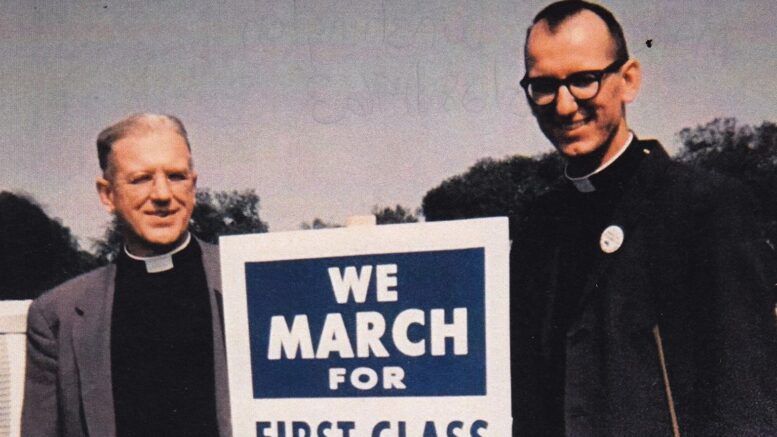The 2020 March on Washington, a virtual experience this year due to coronavirus concerns, took place on Aug. 28, and on the historic event’s 57th anniversary.
The message of change and hope resonates daily. Family members of George Floyd, Trayvon Martin and Ahmaud Arbery, among others, spoke at the 2020 event.
The historic March on Washington took place on Aug. 28, 1963, and where Dr. Martin Luther King delivered his impassioned “I Have a Dream” speech. Other prominent guests featured the late U.S. Representative and Civil Rights icon, John Lewis, and famed activist, Rosa Parks.
While thousands participated in recommitting to Dr. King’s dream this year, about 250,000 attended the landmark event in 1963. Among the massive crowd was Owego resident, the Rev. John Mahler, and his father, Maurice.
Mahler, now 87, recalled the March on Washington was a powerful experience, and also meaningful in a personal way, too. He remarked that the once-distanced relationship with his father only grew closer after that.

From left, Maurice and John Mahler pose at the March on Washington on Aug. 28, 1963. Rev. John Mahler is a long-time resident of Owego. Provided photo.
Mahler, a life-long minister and former minister at Owego’s First Presbyterian Church for 17 years, was living in his birth state of Vermont when he was approached about attending the 1963 march.
He remarked, “I was personally asked to go with a delegation on the march, a group of about 35 or 40 people.” He added that they cared about what was happening and wanted to be a part of it.
Mahler explained that of the entire group, and all from various areas of New England, two were African-American clergy members. It is estimated that of the 250,000 who participated at the march, blacks accounted for 190,000, and whites 60,000.
The day of the event, Mahler remarked that he and his father stood at the bottom of the steps of the Lincoln Memorial, which made the occasion even more impressive, and said, “We could almost greet him [Dr. King].”
In addition to numerous speeches highlighting the day, Mahler recalls several musical acts performed, including the legendary singer and civil and human rights activist, Odetta. Mahler remembers that Odetta announced that she was, “Glad to welcome us all, and even if we weren’t black.”
Mahler commented that he and his father, with good intentions of representing Christians and “dressing up properly,” found only clothing available that is typically worn by Roman Catholic Church clergy.
He chuckled, “People hollered out at us and said things like, ‘Welcome Father, we are so glad you’re here!’”
Mahler explained that getting to Washington, D.C. posed more of an agitation than being at the march itself. The group first stopped off in Philadelphia. It had been arranged via a pastor there for the group to stay at a seminary.
Mahler said his group became worried when the members of the pastor’s congregation did not like the idea. The congregation called an emergency meeting, and where he heard his group being called, “The rebels from the north country,” and who, they thought, were supporting un-American ideals.
Mahler was asked to give testimony and reasoning for why he and the group were there. The hostility eventually lessened, and it was agreed they could stay.
After a second night staying outside Washington, D.C., Mahler remarked, “God’s grace got us through.”
Governor Andrew M. Cuomo, via a recent press release, stated, “Sadly, we have yet to realize Dr. King’s dream. The painful truth is that while the names of the victims change, the color of their skin does not.”
Governor Cuomo added, “Jacob Blake, George Floyd, Breonna Taylor, Amadou Diallo, Sean Bell, Eric Garner, and others continue to fall victim to the racism that is deeply embedded at the core of our criminal justice system. The anger and outrage felt by so many is a warranted response to a flawed system that devalues the lives of black men and women.”
Cuomo continued, “In New York, we turned our anger into action by signing into law the ‘Say Their Name’ Reform Agenda, which fundamentally reforms and re-imagines the state’s criminal justice system. We know the work is not finished. Let us recommit ourselves to that goal and show the nation that at the end of the day, love wins – always.”
Mahler concluded, overall, that the experience in 1963 was, “Very positive, and I was happy to be a part of it, and in a way it was like an adventure,” and added, “Although, there seemed to be more hopefulness then than there is now.”



Be the first to comment on "Owego resident recounts March on Washington "